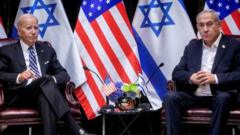58 minutes ago
About sharing
For weeks, President Joe Biden and his senior officials have been losing patience with the way that Israel is fighting the war in Gaza.
They have used increasingly stiff language to convey their displeasure to Israel and the wider world.
The decision to allow the latest ceasefire resolution through the Security Council shows that President Biden has decided that strong words are not enough.
Removing diplomatic protection from Israel’s conduct of the war is a significant step.
It shows the depth of the rift that has opened between the White House and Israel’s prime minister, Benjamin Netanyahu.
Prime Minister Netanyahu responded with a broadside directed at Israel’s most important ally.
He condemned the US decision not to use its veto, saying it had harmed the war effort and attempts to free the hostages taken by Hamas on 7 October last year.
Joe Biden and his top officials might file those remarks under the heading of extreme ingratitude.
The president is deeply attached to Israel, calls himself a Zionist, and has provided the Israeli people with emotional support as well as all the military and diplomatic assistance their state has needed since 7 October last year.
He wants freedom for the hostages as well as the destruction of Hamas as a military force. But Mr Biden wants Israel to do that, as he put it, “the right way”.
In those devastating first weeks of the war President Biden warned Israel not to be blinded by rage, as America had been after the al-Qaeda attacks on 11 September 2001.
The US president travelled to Israel, comforted families of victims of the Hamas attacks and even embraced Mr Netanyahu, with whom he has never had an easy relationship.
President Biden and his secretary of state, Antony Blinken, who’s visited Israel six times since 7 October, have repeatedly told Israel to respect international humanitarian law, which includes an obligation to protect civilians.
At the start of the war, as those first American warnings were being prepared, Prime Minister Netanyahu promised Israelis what he called a “mighty vengeance”.
Since then, more than 30,000 Palestinians, mostly civilians, have been killed with weapons mostly provided by the US.
With Gaza in ruins, famine looming for Palestinian civilians and the prospect of many more deaths in an Israeli offensive on Rafah in southern Gaza, President Biden seems to have had enough of having his advice ignored.
Israel claims that it always respects the laws of war and denies that it blocks humanitarian aid to the people of Gaza.
But evidence has piled up that the Israelis are not telling the truth, with children dying of hunger a few miles from ample stores of food in Israel and Egypt.
The Americans, and the rest of the world, can see the evidence presented by the UN and aid agencies that Gaza is on the brink of famine.
The US military is dropping aid by air and bringing a temporary dock across the Atlantic so that supplies can come to Gaza by sea, while Israel lets only small amounts through the port of Ashdod, a modern container terminal only half an hour’s drive north of Gaza.
The decision not to veto the Ramadan ceasefire resolution is also an attempt by the Americans to push back at accusations that they have enabled Israel’s actions.
It comes after Prime Minister Netanyahu has rejected, vehemently, the Biden Administration’s plans to find a way through the worst Middle East crisis in decades.
The Americans are trying to show that Israel’s impunity from international pressure has limits.
Security Council resolutions are normally considered to have the force of international law. Israel must decide now whether it will respect the resolution, which has been welcomed by Hamas as well as the Palestinian representative at the UN.
Mr Netanyahu’s coalition government relies on the support of Jewish ultranationalist extremists.
They will urge him to ignore the resolution. If he does, the US will have to respond.
If more words are not enough, the biggest lever at President Biden’s disposal controls the air bridge of arms supplies to Israel, dozens of flights by huge transport planes bringing in the munitions Israel has used in the war, as well the ones it would need if it goes through with its plan to widen the ground war to Rafah.
The US-Israel alliance is deep – in 1948 President Harry Truman recognised Israel’s independence 11 minutes after it had been declared – but at times it is dysfunctional.
Crises happen when Israel defies the wishes of American presidents, and harms what they see as US interests.
This isn’t the first time that Benjamin Netanyahu has infuriated the men in the White House.
He has done so regularly since he first became Israel’s prime minister in 1996.
But his defiance of the US has never been this prolonged, or bitter, and no crisis in the long US-Israel alliance has been as serious as the one that’s developed in almost six months of the Gaza war.
Related Topics
2 days ago
6 days ago
4 days ago
